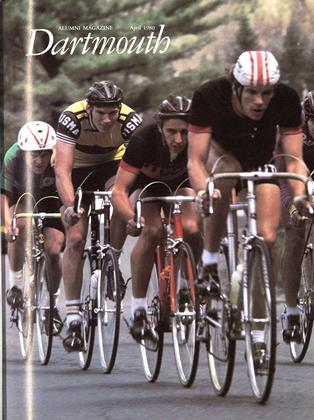The average age of students on campus jumps substantially summer term because of the number of people-many of them long out of college-who come to Dartmouth for an educational vacation. In June, not long after Commencement, the Dartmouth Institute begins-a monthlong opportunity for men and women who are leaders in business and the professions to take time to think. The object is to help people "remain contemporary in a changing world," and the theme of this year's three related courses is "Choice, Reason, and Reality in the 20th Century." The first course, "Ethos and Action," taught by Professor Ronald M. Green from the Religion Department and by Stephen Nichols, professor of Romance languages and literatures, will explore the basic beliefs and values that shape conduct. "Science, Nature, and Society," the second course, taught by Chemistry Professor James F. Hornig and Professor Delo E. Mook an astronomer, will discuss the opportunities and limitations of science as a solution to problems. Anthropologist David Gregory and Blanche Gelfant professor of English, will present the third course, "A New Land, A New Life: Social Dynamics and the American Character."
The national character is also the theme of this year's Alumni College, now in it's 17th year. The title of this summer's program, "Hail, Holy Land: The Idea of America," is taken from a 1638 poem written by an emigrant from the Old World to the New. During the two-week session in mid-August, Alumni College Director Robert McGrath, professor of art history, will be assisted by President Kemeny; Jeffrey Hart, professor of English; Marysa Navarro, a history professor and head of the Women's Studies Program; and by William Cook, head of the African and Afro-American Studies Program and also associate professor of English. Faculty and students alike will have plenty to talk about. Some of the questions slated for discussion include "What does it mean to be an American in 1980? Is it different than it was in 1680? 1780? 1880?" "How do we see ourselves, culturally? Pconfrontolitically? Socially?" and "What is your idea of America? . . . Can it survive the 1980s?"
Perhaps the most striking feature of this year's Alumni College faculty is the range of viewpoints they represent. Chauvinists and feminists, conservatives and liberals, all will find themselves equally provoked. Professor McGrath says the diversity is deliberate. "People are coming to have their minds excited and stimulated," he pointed out when we asked about the sparks that are likely to fly, "and it will be exciting to see some of the best minds at Dartmouth playing off each other." He added that "part of the idea is to provoke thought, and this is done best in a dialectical way. The more diversity there is in the lectures, the more stimulating our discussion groups will be."
McGrath also mentioned the pleasure of teaching older students for a change. He said he enjoys dealing with students as peers, and also looks forward to the opportunity to take more "intellectual risks" than he does with undergraduates. He likes breaking away from the standard pattern of lectures as well as from the "adversary relationship" that sometimes exists between professors and undergraduates. Professor Cook said that what he most enjoys about teaching Alumni College is "being challenged by students who are vocal-students who are sure and confident in their views." Another benefit he mentioned is that a professor can make particular kinds of assumptions about experiences that just can't be made with freshmen: "You can talk about World War II without feeling as though you're referring to ancient history."
 View Full Issue
View Full Issue
More From This Issue
-
 Feature
FeatureMaking Books
April 1980 By Robert H. Ross -
 Feature
FeatureLife in High Places
April 1980 By Dan Nelson -
 Feature
FeatureExtra Credits & Bonus Points
April 1980 By Nancy Wasserman '77 -
 Article
ArticleWho in Hell Was Jeff Tesreau?
April 1980 By Edward D. Gruen '31 -
 Article
ArticleAdapting to the Heights
April 1980 -
 Class Notes
Class Notes1963
April 1980 By DAVID R. BOLDT
Article
-
 Article
ArticleTHE practical workings of the preceptorial system
FEBRUARY 1906 -
 Article
ArticleFOOTBALL
OCTOBER, 1907 -
 Article
ArticleWhat Do You Bet?
January 1950 -
 Article
ArticleFlux-tour
JAN./FEB. 1979 -
 Article
ArticleNew York
OCTOBER 1970 By ALAN V. DAVIES ’63, Charles McAllister ’59 -
 Article
ArticleProgramming Social Change
Mar/Apr 2006 By Bonnie Barber

